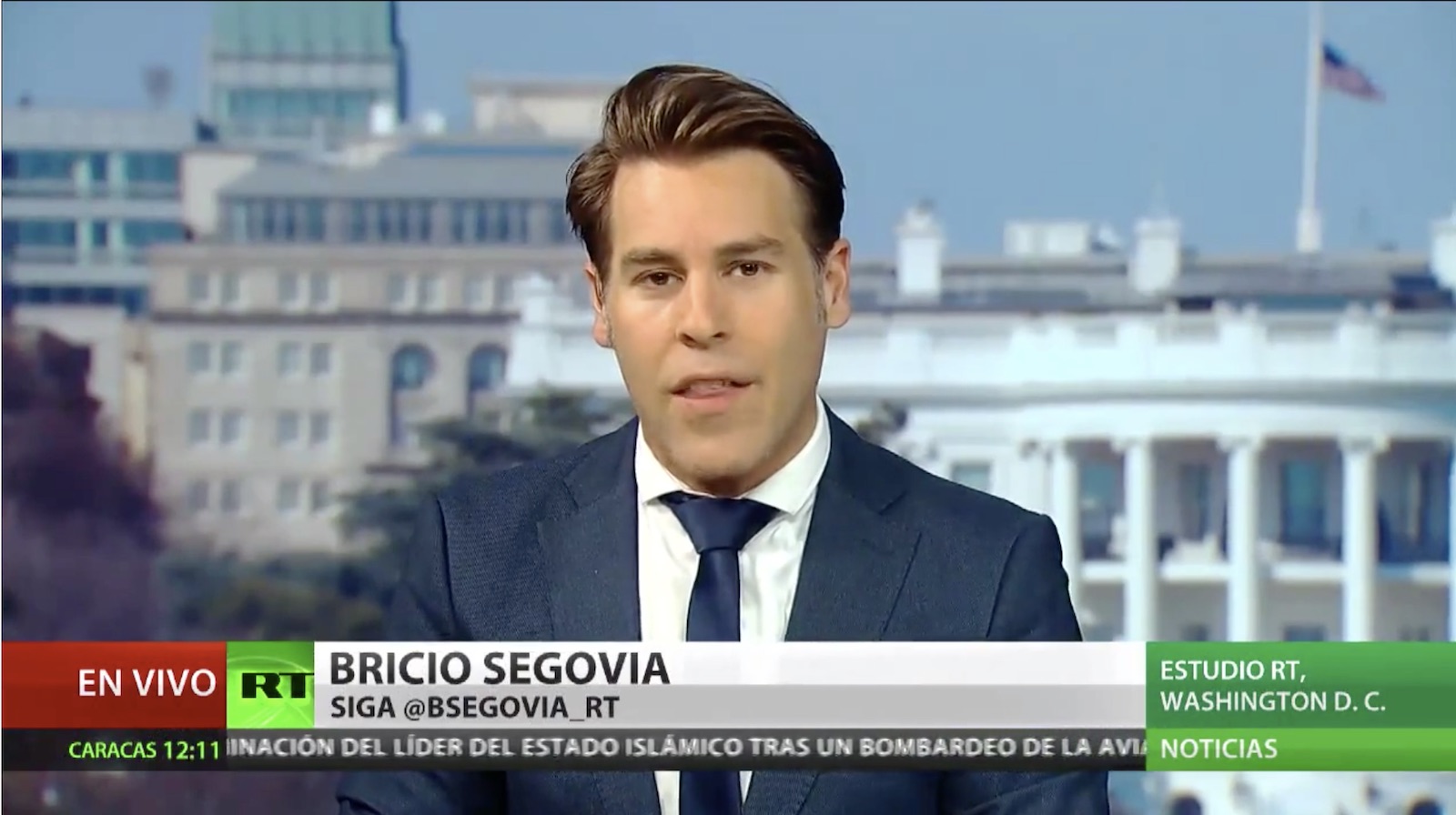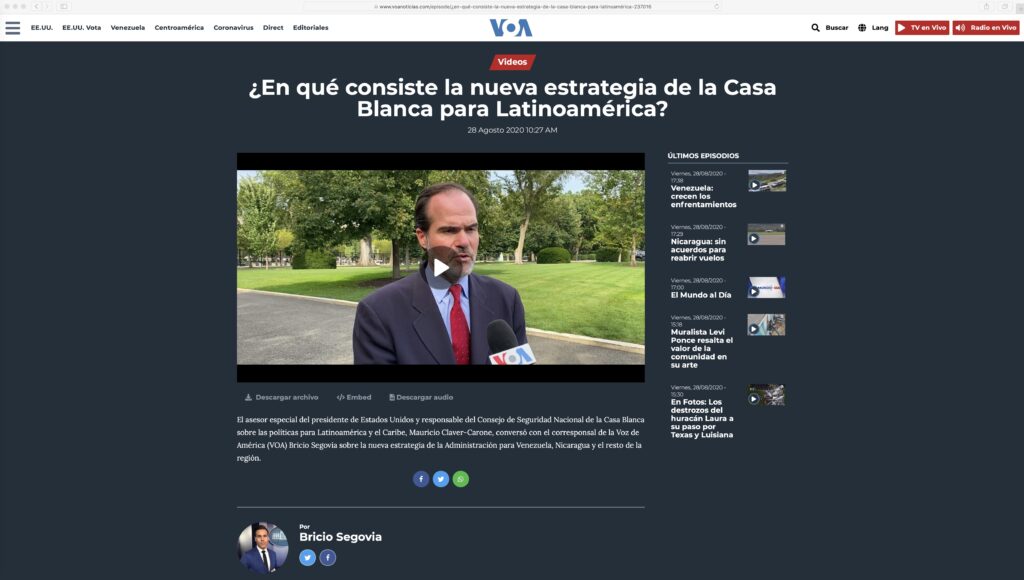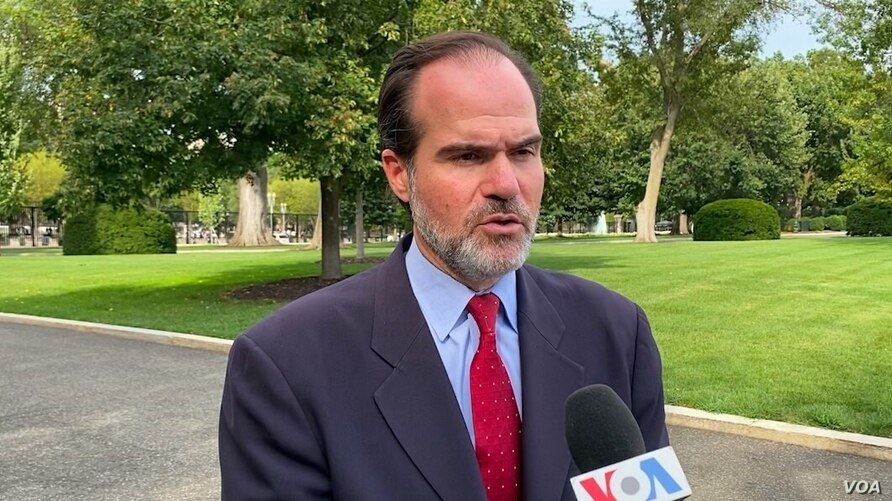USAGM Watch Commentary
Bricio Segovia, a journalist from Spain now working for the Voice of America (VOA) on a special visa says VOA editors have censored his interview with Mauricio Claver-Carone, a senior adviser to President Trump on Latin America. A senior VOA manager and VOA editors who are not Trump supporters strongly deny his claim of censorship. Segovia was previously employed by Russian state broadcaster RT and worked for a French public TV channel. A month before the interview, it was reported that his U.S. work permit may not be renewed by the new Trump-appointed management of the U.S. Agency for Global media (USAGM) following a review of personnel practices under the previous agency leadership.

Speaking on background, a senior Voice of America program manager who has been with the agency for many years and does not have ties to the Trump administration, described one of the questions in the Bricio Segovia’s interview with Mauricio Claver-Carone as “absolutely inappropriate” because it dealt with the reporter’s own personal employment situation and appeared to lobby for support. The senior VOA manager noted that the interview was used by the VOA Spanish Service without the questionable segment.
VOA newsroom editors who are not known to be sympathetic toward President Trump or Trump-appointed new USAGM CEO Michael Pack, who was nominated by President Trump, apparently also concluded late Friday evening that Mr. Segovia blindsided the White House official by trying to get his response to a question related to the reporter’s own personal employment status.
Segovia is one of a number of VOA foreign reporters whose work visas may not be renewed by USAGM. U.S. laws require the federal agency in charge of the Voice of America to give preference in hiring to American citizens and allow hiring of citizens of other countries only if American citizens with equal foreign language and broadcasting skills cannot be recruited.
There may be hundreds if not more U.S. citizens who are Spanish-speaking television reporters, producers and anchors, many of them with reporting experience in Latin America. It is not known how a citizen of Spain who previously worked for the Russian state broadcaster controlled by President Putin’s allies managed to get hired by the Voice of America under the special U.S. work visa program.
The answer that White House advisor Mauricio Claver-Carone gave to Segovia’s question about VOA work visas issue was general in nature. It was not clear whether Claver-Carone knew about specific details of the VOA work visas controversy.
According to sources in the VOA newsroom, Mr. Segovia uploaded his interview on Friday morning followed by an e-mail, “Interview to White House Official Re: Situation at VOA,” sent to Newsroom chief Yolanda Lopez, who was reported to be on vacation at the time. The e-mail also went to the VOA newsroom’s editor in charge.
I uploaded to my interview to Special Assistant to the President and Senior Director for Western Hemisphere Affairs in the White House National Security Council, Mauricio Claver-Carone. We talked about the White House new strategy to Latin America and the Caribbean but also about the situation VOA foreign-born journalists are facing with the USAGM inaction to renew their J-1 visas. Please see below a translation of the two questions and answers referring VOA. The interview can be found on [VOA] VIDEO SHARE>MAURICIO CLAVER-CARONE. Thank you.
-Question: Within the frame of this strategy for the region, to show where the US stands in Latin American and Caribbean matters, one of the key organizations to ensure press freedom in this reason is the Voice of America. At this moment, USAGM CEO, which is the agency that oversees VOA has blocked the visa extension of many foreign journalists, which is preventing VOA to carry out its mission in the region and, specially, in Venezuela. Is the White House aware of this situation and, if so, is it willing to act?
-Answer: Unfortunately, due to the pandemic and the border closure and travel restrictions, etc., there have been many consequences in many places. It has also affected the Voice of America, which has had a key role in Venezuelan matters. I frankly congratulate you for the duty that you all have carried out. We are watching this situation and I hope it gets resolved as soon as possible.
-Question: Is the White House willing to put some pressure along with the Department of State so that Mr. Michael Pack authorizes these visa extensions, since now the journalistic duty of this group of professionals is being suppressed with no reason provided and with a case-by-case review that has seen no evolution and has not been explained?
-Answer: We value the journalistic duty that you and all VOA journalists do and we will have that conversation.
The VOA Spanish Service used Bricio Segovia’s interview in two online reports, “Mauricio Claver-Carone: ‘Estamos viendo un régimen de Maduro más debilitado,” and “En qué consiste la nueva estrategia de la Casa Blanca para Latinoamérica?,” but VOA Spanish Service editors deleted the VOA work visas question and answer.


An e-mail sent out Friday evening by a VOA newsroom editor to VOA staff who are members of a limited distribution called “Washington News Group” said “DO NOT USE! ON FRAME.IO: Interview to White House Official Re: Situation at VOA.”
Dear Colleagues,
Please DO NOT use this interview on any platforms.
If you have already used it, please let us know as soon as possible.
VOA newsroom editors did not respond to e-mails from USAGM Watch seeking to determine how they arrived at their decision. It’s thought that managers later modified the directive to allow the use of the interview without the questionable segment.
USAGM Watch could not determine whether the interview was arranged in prior consultations with the VOA newsroom and whether VOA English White House correspondents were alerted and allowed to watch the interview being conducted, or invited to participate in the interview and could not participate for some reason. VOA interviews with high-level administration officials are often conducted jointly by VOA English and VOA foreign language service journalists when they deal with regional or foreign country-specific issues.
There is no indication that USAGM CEO Michael Pack, who is a political appointee, tried to intervene in the White House interview controversy. He said recently that “There needs to be a separation between us the political appointees and what journalists are reporting.” “I would never tell a journalist how to cover a story or what to say,” Pack added. “However, I am there to make sure that the procedures and practices that ensure the highest journalistic standards and the contract of the VOA Charter are fulfilled,” Pack said.
Pack’s agency head position is different from the job of the VOA director. Pack chose a longtime Voice of America manager Dr. Elez Biberaj as acting VOA director while the search for a permanent VOA director continues. Biberaj had worked closely with former VOA director Amanda Bennett who was appointed during the Obama administration. His public Facebook page shows that he and his family have ties to Democratic Party politicians.
Final decisions on Voice of America programming issues would be made by Biberaj, not by Pack, but USAGM Watch was unable to confirm whether VOA central news editors consulted with Biberaj on Bricio Segovia’s interview. Dr. Biberaj was reported to be on personal leave this week. A few days ago, Biberaj called the recent VOA Urdu Service partisan Joe Biden video incident “serious breach of our journalistic standards and a violation of the VOA Charter…” that “implied VOA’s endorsement of a partisan election message.”
USAGM Watch could not determine who among the previous VOA management team hired Segovia and decided to give him the special work visa which is usually reserved for journalists with hard to find language skills and coming to the U.S. from countries other than member states of the EU. It is also not known whether VOA managers who hired Mr. Segovia were familiar with his prior work for Russia‘s state broadcaster RT. Mr. Segovia did not respond to an e-mail sent by USAGM Watch.
In an e-mail sent to agency employees on Friday, USAGM CEO Michael Pack alluded to work security problems at the agency inherited from the previous management team, but he did not address the VOA work visas issue.
Dear Colleagues,
I became your CEO a bit over two months ago, and so much has already happened. Your work ethic and staunch commitment to our agency and our country have proven invaluable during the transition. As I’m continuing to pursue the mandate to make USAGM more effective and efficient, I want to take this opportunity to discuss recent developments, some of which you may have heard about, and to share more about my vision for reorienting USAGM toward its stated mission, “to inform, engage, and connect people around the world in support of freedom and democracy.”
I recently released a report produced by the U.S. Office of Personnel Management (OPM) that reveals severe and systemic personnel suitability and vetting breakdowns here at USAGM. This report shows that, for at least the past 10 years, USAGM leadership ignored common national security protocols and essential government human resources practices. It also shows that leadership repeatedly failed to correct these infractions, which were further identified in several other reports produced not just by OPM, but also by the Office of the Director of National Intelligence.
We immediately took the required steps to get our agency on the right track, including ordering a comprehensive inquiry into USAGM’s personnel operations, requesting briefings with the Chairmen and Ranking Members of USAGM’s Congressional oversight committees, ordering a surge team of security experts to USAGM to overhaul our security protocols, and carrying out appropriate personnel actions.
Let’s commit together to address these security lapses to ensure that our journalists, contractors, grantees, and U.S. government employees – and all our other colleagues – are kept safe. This will allow us to also protect U.S. national security and our agency’s ability to fulfill its mission.
Last week, I announced we revived USAGM’s Office of Internet Freedom (OIF). OIF was created in 2016, but its operations were shelved by previous agency leadership. We all understand the critical need to support technologies that allow individuals to securely access and share information online. Bolstering internet firewall circumvention is a top priority of my tenure. OIF will help embolden those fighting for liberty around the world by allowing them to evade censorship and surveillance.
I’ll continue to share updates as we move forward together. But I very much want to hear from you along the way. We’re already planning a CEO Townhall to allow for more communication.
I look forward to getting to know as many of you as possible in the months ahead. Thank you again for your warm welcome. And thank you for your determination and willingness to help make USAGM a better place to work and serve the American people.
Sincerely,
Michael
Bricio Segovia made a name for himself working among others for Russian state broadcaster RT. The possibility that he would have to leave VOA due to changes instituted by Pack was reported by The Hill and The Washington Post.
An RT video still online shows that Bricio Segovia went in 2014 into the Russian-occupied part of Ukraine with a female Russian RT reporter who, as Bricio Segovia said in his RT report, “had good connections with the Russian intelligence services.”
In the video he appears surprised that the Russians would help them cross the border into the Russian-occupied part of Ukraine while the female RT reporter who was Russian and described by Segovia as “awesome” seemed not at all surprised.
The video report which still appears on the RT YouTube channel is one-sidedly pro-Russian government and does not identify Russia as the aggressor against Ukraine and a violator of international law condemned and sanctioned by many democratic countries.
“I have never seen something as awful as what’s being done to VOA in the United States, in the country of liberty,” The Hill quoted Bricio Segovia who still works for VOA but may not get his work visa renewed. The Hill article was published on July 24.
“At the end of the day we love this country,” the article quotes Segovia. “That’s why we’re here and it’s sad to see how Americans are going to lose the public broadcaster they deserve as citizens.”
The Washington Post reported on August 2 that “Bricio Segovia [had] less than a month before his time is up. With his visa set to expire at the end of August, the Voice of America reporter will be obligated to leave the United States and go back to Spain, his native country.”
Segovia was hired by VOA under the watch of the former USAGM CEO John Lansing and ex-VOA director Amanda Bennett. Both were appointed during the Obama administration. Lansing left USAGM amid various management scandals in September 2019 and became the head of National Public Radio (NPR).
Bennett, and her chosen deputy at VOA, Sandy Sugawara, both resigned ahead of a senior personnel housecleaning by Michael Pack.
BBG – USAGM Watch has documented over the last ten years hundreds of cases of biased, partisan and substandard reporting by the Voice of America, as well as multiple highly partisan anti-Trump social media messages by several VOA reporters whose public actions violated the VOA Charter and journalistic standards. Most of these violations were reported when John Lansing and Amanda Bennett were in charge.
Not a single case of Michael Pack trying to interfere with Voice of America’s journalistic output or trying to promote pro-Trump messages has been reported to us so far during his first several weeks on the job. Both Democrats and Republicans work as USAGM Watch volunteer reporters and commentators. Most of USAGM Watch contributors are former and some current Voice of America, Radio and TV Marti, and Radio Free Europe/Radio Liberty (RFE/RL) journalists and managers. We also receive occasional input from former and some current Radio Free Asia (RFA) and Middle East Broadcasting Networks (MBN) journalists and managers.
